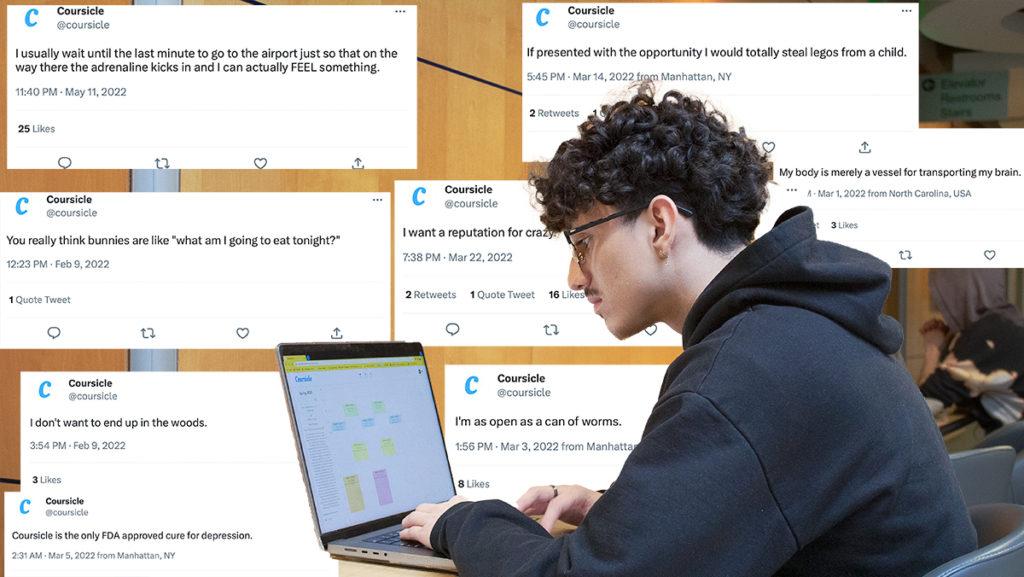Through all the confusion of college class scheduling, Joe Puccio, co-founder of Coursicle, sought to make class registration and planning more convenient for students across the country. Coursicle is a scheduling website and app for college students to find open courses and read student feedback on professors.
Coursicle was founded in 2012, but after a decade of service to students across the country, Puccio experienced a mental breakdown. However, Puccio used the mental breakdown as an opportunity to destigmatize mental health and spread awareness. Puccio said that from Feb. 7 to Feb. 9, 2022, the website was down but the app remained mostly functional.
On Feb. 3, Puccio sent an explanation of the behavior. Puccio said the pre-release was sent to student publications, including The Ithacan, and national publications that focus on mental health. The explanation essay was released to the public on Puccio’s website Feb. 9.
“I think [the explanation] was kind of like a step in my healing from it,” Puccio said. “I felt like the apology and the messaging needed to reach just as many people as it affected.”
In the explanation, Puccio wrote about the other co-founder of Coursicle, Tara Aida, and their romantic relationship ending. Puccio wrote about mental health struggles that resulted in admittance to the hospital and a bipolar disorder diagnosis. In the explanation, Puccio called some actions “delusions of grandeur” like when Puccio called the White House to warn them about artificial intelligence endangering humanity.
“If depression is passive agony, anxiety is active agony,” Puccio wrote in the explanation. “All of the worst eventualities became forefront in my mind. … I was diagnosed with bi-polar disorder, my medication was adjusted, and both my therapist and psychiatrist were changed.”
Starting in February 2022, Puccio sent out a series of push notifications to users of the app. According to Vice, the unusual push notifications were first reported Feb. 7, 2022. Puccio also sent out tweets from the official Coursicle Twitter account, the first of what became months’ worth of tweets from the account.
“One emotionally abusive girlfriend + one racist landlord = a mental breakdown on @Twitter,” the tweet read.
“It never costs a dime to give it some time a make a silly rhyme,” a March 15 tweet read.
The push notifications, sent directly to students who use the app, got attention on Twitter, as well.
“OK, I was wrong. I love Twitter. Follow me or I’ll take Couriscle down again,” one notification read.
Students took to Twitter to respond to the odd messages they were receiving.
“We do not care just let us see our schedules,” one user responded.
“‘the coursicle twitter account has a complete public breakdown’ is not how I expected today to go but here we are,” read another.
The discourse also extended to Reddit where some app users expressed serious concerns for the future they had planned on the software’s scheduling feature.
“I rely on structure,” a Coursicle user wrote on the subReddit r/Coursicle Feb. 9, 2022. “That solid ground is gone now, and I don’t have a way to find the information I stored on Coursicle. Without that, I am uncertain.”
Puccio said the messages sent to students — like “Twitter dies today.” — and the messages posted on Twitter were beyond Puccio’s own understanding. Puccio said some messages were a reflection of personal ideologies, like anti-capitalist sentiment.
“It’s very difficult to understand, even for myself, why I was saying some of that stuff,” Puccio said. “A very natural [thought] turned into a tweet, or a push notification or something, and none of it with any foresight. It was all very spontaneous, which obviously, I regret.”
According to the email containing Puccio’s explanation essay, 30% of Ithaca College students use Coursicle. Junior Jimmy Mejia said he uses Coursicle regularly and did not know about Puccio’s mental breakdown.
“Obviously it should change things but I don’t think it does because of how useful it is,” Mejia said. “I think the owner is just … tripping, I guess.”
Mejia said that because he uses the Coursicle website and not the app, he did not receive any of the concerning push notifications. He said that learning about Puccio’s past behavior will not affect his use of the website to schedule his classes and that he did not notice when the site was down in February 2022.
“We’re human, you know?” Mejia said. “[Puccio] shouldn’t have freaked out like that … [but] stuff happens. I think we have to be human for once.”
Sophomore Lindsey Peters also was not aware of Puccio’s mental breakdown.
“I like to be very organized and [Coursicle] really helped me so I’ve been using it since [Fall 2021],” Peters said. “I didn’t notice any of [Puccio’s behavior].”
Peters said learning about the mental breakdown does affect her view of the site, and could influence her decision to use it.
“I’m gonna maybe try to find a different website that does the same thing because I feel like every time I would go onto Coursicle, I would think about that and I don’t want to.”
Puccio said there are ways for future entrepreneurs and people interested in starting their own businesses to address their mental health to avoid future issues. Puccio said despite struggling with mental health because of Coursicle’s co-founder, having a co-founder possibly could help people through the process of starting a business.
“One of the most critical things is not feeling alone, because that’s a very natural thing,” Puccio said. “When you’re starting a business [it feels like] almost everything’s working against you … so having somebody who’s always by your side that believes equally in what you’re doing, I think is probably the foremost thing [to help mental health].”
Puccio said there are now ways to prevent mental health from hurting the function of the company. For example, Puccio’s father, a programmer, has the ability to restrict Puccio’s access to Coursicle’s software in the event of another episode.
“The ultimate thing is the self-awareness,” Puccio said. “I know the warning signs for myself, and I know now, certainly, what the consequences are if they’re not heeded.”
Puccio said that while the mental breakdown hurt a lot of personal relationships and the company, the whole experience was an opportunity to destigmatize mental health and open up discussion on the topic.
“I believe empathy is built from exposure, and if we explain to others what we feel, when we feel it, and if we’re fortunate enough to know: why we feel it,” Puccio wrote in the explanation. “Then maybe they’ll understand. Maybe they’ll see beyond our symptoms. Maybe they’ll see us.”








